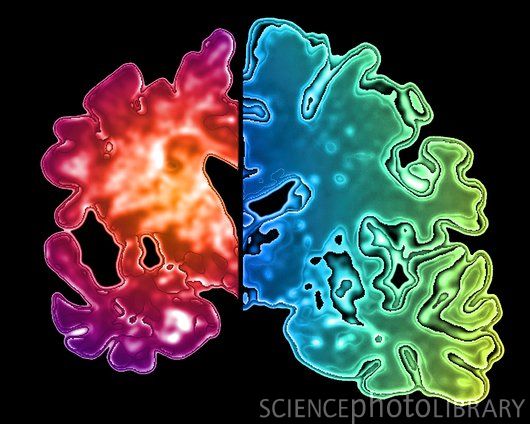研究表明,除了主要组织兼容复合物(MHC)分子,调控免疫细胞的遗传因素也能影响对接种疫苗的反应强度。这一发现可有助于预防神经炎症反应,后者是人体接种疫苗的主要障碍。

阿尔兹海默症病人大脑切面图(左)与正常大脑切面图(右)
这项研究发布在最新一期《Immunology》上。对阿尔兹海默症的部分研究集中在β-淀粉样多肽(Aß)的疫苗接种上,一般认为在大脑中这些多肽聚集后能引发疾病。Aß疫苗在6%的病人中引起严重的神经炎症反应,为了研发更安全、有效的治疗方案,研究人员有必要理解机体对Aß肽起反应的因素。
MHC分子把抗原递呈到免疫细胞中,Inserm/UPMC联合研究小组对不同MHC的小鼠进行研究。由于该分子具有广泛的遗传多样性,不同的免疫反应强度可从这一点得到解释。事实上,接种Aß疫苗后,不同MHC的小鼠具有不同的细胞免疫反应。研究人员对MHC进一步研究,通过让小鼠表达其它类型的MHC分子,发现独立于遗传背景,有关于MHC分子的,对抗β-淀粉肽有着重要作用的另一因素。最后,科学家们证实了这些因素与一类白细胞亚群——调节性T细胞有关。
免疫疗法在对抗阿尔茨海默氏症中存在很大的希望,由于该研究指出了免疫细胞定位的新方法,因此,这一疗法可得到改善。然而,对小鼠的研究还有待于在人体中证实。(生物探索译 Pobee)
相关英文论文摘要
MHC-Independent Genetic Factors Control the Magnitude of CD4+ T Cell Responses
to Amyloid-β Peptide in Mice through Regulatory T Cell-Mediated Inhibition
Accumulation of amyloid-β peptide (Aβ) is considered the triggering factor of pathogenic lesions in Alzheimer’s disease (AD), and vaccines targeting Aβ are promising therapeutic options. However, the occurrence of meningoencephalitides attributed to T cell responses in 6% of Aβ-immunized patients underscores the need for a better understanding of T cell responses to Aβ. We characterized the parameters controlling the magnitude of Aβ-specific CD4+ T cell responses in mice. T cell responsiveness to Aβ1-42 was highly heterogeneous between mouse strains of different H-2 haplotypes, with SJL/J (H-2s) mice displaying a strong response, mainly specific for Aβ10-24, and C57BL/6 (H-2b) mice displaying a weak response to Aβ16-30. Surprisingly, C57BL/6 mice congenic for the H-2s haplotype (B6.H-2S), which display a “permissive” MHC class II allele for presentation of the immunodominant Aβ10-24 epitope, showed a very weak CD4+ T cell response to Aβ, suggesting that MHC-independent genes downmodulate Aβ-specific CD4+ T cell responses in C57BL/6 background. Vaccine-induced CD4+ T cell responses to Aβ were significantly enhanced in both C57BL/6 and B6.H-2S mice upon depletion of regulatory T cells (Tregs), whereas Treg-depleted SJL/J mice displayed unaltered Aβ-specific T cell responses. Finally, Treg depletion in C57BL/6 transgenic APPPS1 mice, a mouse model of AD, results in enhanced vaccine-induced CD4+ T cell responses in AD compared with wild-type animals. We concluded that the magnitude of Aβ-specific CD4+ T cell responses is critically controlled in both physiological and pathological settings by MHC-independent genetic factors that determine the overall potency of Aβ-specific Treg responses.
英文论文链接:https://www.jimmunol.org/content/early/2011/09/25/jimmunol.1003953.short?rss=1







